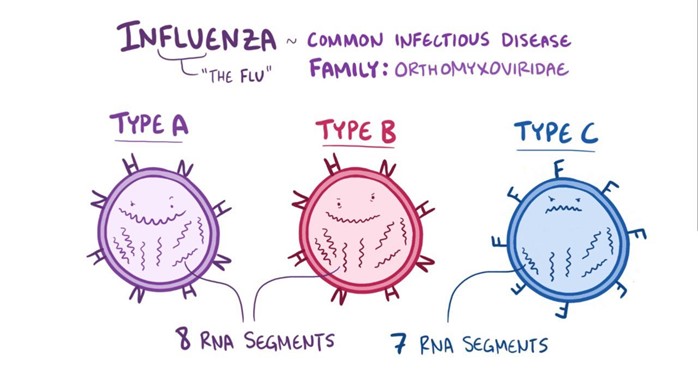The school nurse identified 12 students with confirmed cases of influenza A. The families of the children are advised to keep the children home for a minimum of 5 to 7 days. Which of the following is an appropriate action by the nurse?
Discipline in the school setting for improper handwashing.
Education regarding respiratory and hand hygiene.
Running a mandatory flu clinic.
Closing the school for 6 weeks.
The Correct Answer is B
Choice A reason: Discipline in the school setting for improper handwashing is not an appropriate action by the nurse, as it may not prevent the spread of influenza or promote healthy behaviors. Influenza is a viral infection that affects the respiratory system and can be transmitted by direct or indirect contact with respiratory droplets from an infected person. Handwashing is one of the most effective ways to prevent the transmission of influenza and other infectious diseases, but it requires proper technique, frequency, and duration. The nurse should not punish or blame the students for their handwashing habits but rather educate and encourage them to wash their hands with soap and water for at least 20 seconds, especially before and after eating, after using the bathroom, after coughing or sneezing, and after touching potentially contaminated surfaces.
Choice B reason: Education regarding respiratory and hand hygiene is an appropriate action by the nurse, as it helps to prevent the spread of influenza and promote healthy behaviors. The nurse should provide accurate and relevant information to the students, staff, and parents about the causes, symptoms, prevention, and treatment of influenza. The nurse should also teach and demonstrate proper respiratory and hand hygiene practices, such as covering the mouth and nose with a tissue or elbow when coughing or sneezing, disposing of used tissues in a trash can, washing hands frequently with soap and water or using alcohol-based hand sanitizer, avoiding touching the eyes, nose, and mouth, and staying away from sick people.
Choice C reason: Running a mandatory flu clinic is not an appropriate action by the nurse, as it may not be feasible, ethical, or effective in preventing influenza. Influenza vaccination is one of the best ways to prevent influenza and its complications, but it requires informed consent, adequate supply, trained personnel, and appropriate timing. The nurse cannot force or coerce anyone to receive the flu vaccine without their permission or against their wishes. The nurse should respect the autonomy and preferences of the students, staff, and parents, and provide them with evidence-based information about the benefits and risks of influenza vaccination. The nurse should also collaborate with the health department and other community partners to organize voluntary flu clinics that are accessible, affordable, and convenient for those who want to receive the vaccine.
Choice D reason: Closing the school for 6 weeks is not an appropriate action by the nurse, as it may not be necessary, practical, or beneficial in preventing influenza. Influenza outbreaks can vary in severity, duration, and impact depending on several factors, such as the strain of the virus, the level of immunity in the population, the availability of vaccines and antiviral medications, and the implementation of preventive measures. The nurse should monitor the situation closely and follow the guidance of the health authorities regarding school closure decisions. The nurse should also consider the potential consequences of school closure on the student's education, socialization, nutrition, safety, and mental health. The nurse should weigh the benefits and harms of school closure against other alternatives, such as increasing ventilation, cleaning and disinfecting surfaces, screening for symptoms, isolating sick students or staff members, reducing class size or mixing groups.

Nursing Test Bank
Naxlex Comprehensive Predictor Exams
Related Questions
Correct Answer is B
Explanation
Choice A reason: Fluconazole (Diflucan) is an antifungal medication that is used to treat infections caused by fungi, such as candidiasis, cryptococcosis, and histoplasmosis. It is not effective against anthrax, which is a bacterial infection caused by Bacillus anthracis.
Choice B reason: Ciprofloxacin (Cipro) is an antibiotic medication that belongs to the class of fluoroquinolones. It is used to treat various bacterial infections, including anthrax. It works by inhibiting the DNA synthesis of the bacteria and preventing them from multiplying. Ciprofloxacin is one of the recommended medications for post-exposure prophylaxis and treatment of anthrax, according to the Centers for Disease Control and Prevention (CDC).
Choice C reason: Varenicline (Chantix) is a medication that is used to help people quit smoking. It works by blocking the effects of nicotine on the brain and reducing the cravings and withdrawal symptoms. It has no role in the prevention or treatment of anthrax.
Choice D reason: Potassium iodide (KI) is a medication that is used to protect the thyroid gland from radioactive iodine in the event of a nuclear or radiological emergency. It works by saturating the thyroid with non-radioactive iodine and preventing it from absorbing radioactive iodine. It has no role in the prevention or treatment of anthrax.

Correct Answer is B
Explanation
Choice A reason: A black tag is not the appropriate priority tag for this client, as it indicates that the client is dead or has injuries that are incompatible with life. A black tag is used for clients who have no signs of life, such as pulse, respiration, or pupillary response, or who have severe injuries that cannot be treated with the available resources, such as massive head trauma, decapitation, or incineration. A black tag means that no further care or intervention is provided to the client.
Choice B reason: A red tag is the appropriate priority tag for this client, as it indicates that the client has life-threatening injuries that require immediate attention and treatment. A red tag is used for clients who have compromised airway, breathing, or circulation, such as respiratory distress, shock, severe bleeding, chest pain, or head injury. A red tag means that the client is given the highest priority and is treated as soon as possible.
Choice C reason: A green tag is not the appropriate priority tag for this client, as it indicates that the client has minor injuries that do not require urgent care or intervention. A green tag is used for clients who have stable vital signs and can walk or move without assistance, such as abrasions, sprains, fractures, or minor burns. A green tag means that the client is given the lowest priority and is treated after all other clients.
Choice D reason: A yellow tag is not the appropriate priority tag for this client, as it indicates that the client has serious injuries that require observation and treatment within a short time frame. A yellow tag is used for clients who have potential complications or deterioration of their condition, such as abdominal pain, pelvic injury, open wounds, or spinal injury. A yellow tag means that the client is given the second highest priority and is treated within 30 to 60 minutes.
Whether you are a student looking to ace your exams or a practicing nurse seeking to enhance your expertise , our nursing education contents will empower you with the confidence and competence to make a difference in the lives of patients and become a respected leader in the healthcare field.
Visit Naxlex, invest in your future and unlock endless possibilities with our unparalleled nursing education contents today
Report Wrong Answer on the Current Question
Do you disagree with the answer? If yes, what is your expected answer? Explain.
Kindly be descriptive with the issue you are facing.
